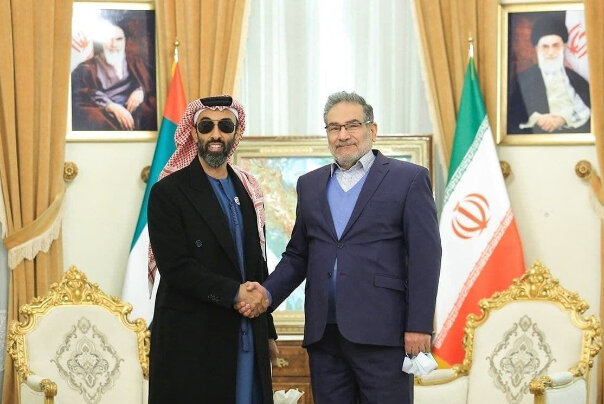

TEHRAN – The mysterious, taciturn man of the United Arab Emirates finally made it to Iran on Monday, setting the stage for the gradual development of ties starting with economic cooperation.
Leading a delegation of Emirati officials, the bespectacled UAE National Security Advisor Sheikh Tahnoon bin Zayed Al-Nahyan visited Tehran on Monday after weeks of speculation about the date of the visit. He first met with Ali Shamkhani, Secretary of Iran’s Supreme National Security Council, and then Iranian President Ayatollah Seyed Ebrahim Raisi.
The visit comes against a backdrop of Emirati push to patch up ties with one-time rivals such as Qatar, Turkey, and Iran. Interestingly, Sheikh Tahnoon played a pivotal role in amending ties with all these countries, an indication of the powerful position the man enjoys in the Emirati government. He traveled to Qatar and Turkey and met with the two countries’ leaders respectively. After his visits to Doha and Ankara, other Emirati officials met with their Qatari and Turkish officials. This suggests that Sheikh Tahnoon served as a road roller paving the way for further high-level meetings between Emirati leaders and their rivals.
But will his visit to Tehran lead to leaders-level meetings between Iran and the UAE? The answer is not easy. But the range of issues at play between Tehran and Abu Dhabi makes it difficult to think of a meeting à la the one that took place of late between Abu Dhabi Crown Prince Mohammad bin Zayed and Turkish President Recep Tayyip Erdogan.
This, however, does not mean that a thaw in Iranian-Emirati ties is impossible. Diplomatic contacts between Iran and the UAE have never gone down to zero over the past decade. They only decreased at some points due to a number of mainly political disputes. But while diplomatic ties have experienced some ups and downs, economic ties remained up and running.
And continued economic cooperation seems to have ultimately created a common ground for Tehran and Abu Dhabi to de-escalate tensions at a time when solving political disputes is neither easy nor possible, at least in the short run.
Emphasis on the need to develop economic ties stood out in Sheikh Tahnoon’s meeting with Shamkhani. “Warm and friendly relations with neighbors and the exchange of economic, trade, and investment capacities are the main priorities of the Islamic Republic of Iran in the field of foreign policy,” the top Iranian security official told his Emirati counterpart.
Shamkhani added, “The countries of the Persian Gulf, if they cooperate and work together, can play an important role in the regional and global economy while creating development and prosperity for their nations as an energy hub.”
Sheikh Tahnoon, for his part, welcomed the proposal to strengthen economic ties with Iran. He described the economic potential of the two countries in the fields of transit, energy, transportation, health, and investment as very broad. He added, “It is necessary to identify and eliminate the obstacles ahead by forming specialized working groups while accurately enumerating the areas of joint cooperation in various economic fields.”
Politically, Iran and the UAE are on opposite sides of many disputes in the region. In addition to the Emirati claim to the three Iranian islands of the Persian Gulf, Tehran and Abu Dhabi have disagreements on the situation in Yemen, Lebanon, Iraq, and Syria. Recently, Israeli presence in the UAE has been added to the long list of differences.
During Sheikh Tahnoon’s meeting with Ayatollah Raisi, the Iranian president appeared to warn about the “sinister goals” of Israel affecting ties between Iran and the UAE. “The Zionists in the region are pursuing their sinister goals and wherever they can find a foothold, they will turn it into a tool for expansionism; therefore, regional countries should be careful,” Raisi said.
Ayatollah Raisi added, “The security of the countries of the region is intertwined and Iran supports the security of the Persian Gulf littoral states.”
Sheikh Tahnoon underlined the common destiny of the people of the region. He said, “We are the children of this region and we have a common destiny, so the development of relations between the two countries is on our agenda.”
Referring to his detailed talks with his Iranian counterpart, Sheikh Tahnoon said, “These meetings will be a turning point in the relations between the two countries.”
 RSS Feed
RSS Feed















 December 7th, 2021
December 7th, 2021  Awake Goy
Awake Goy  Posted in
Posted in  Tags:
Tags: 













